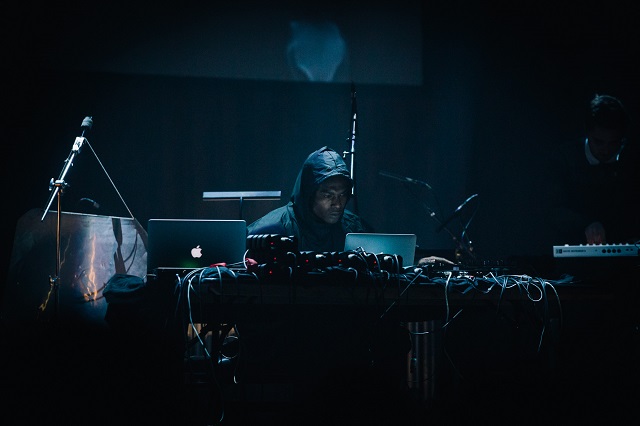Exclusive: Watch Actress’s Haunting Boiler Room Set in Mumbai
Also, in an insightful interview, the London-based producer talks about making art in times of cultural and political distress

Actress at the Budweiser X Boiler Room What’s Brewing in Mumbai. Photo: Zacharie Rabehi
Since 2010, Boiler Room has become a synonym for the global underground. With millions tuning in to watch artists such as Jamie XX, Four Tet, Skepta, Nils Frahm, Carl Cox and many others, the online music broadcasting service is more than just a 21st-century innovation that’s been inducted into club culture. It is a document of our times–how we dance, how we behave at parties, the kind of music we like and something that is intrinsic to our generation–how we troll on the Internet.
Today, Boiler Room is arguably one of the most valuable music properties in the world. Connecting niche audiences with nascent music scenes across the globe, it provides a common space for impassioned debates, sometimes leading to the discovery of gems such as Maalem Mahmoud Guinia, one of Northern Africa’s fascinating musical exports. It’s one of the few platforms left that, at least on the face of it, encourages exploration rather than consumption.
Earlier this month, Boiler Room, in association with Budweiser, hosted its maiden India show at Mumbai’s popular music venue Antisocial Khar. Headlined by the London-based experimental electronic producer Actress, the bill also featured Mumbai-based left-field electronic producer Sandunes, Red Bull Academy graduate Oceantied and Consolidate head _RHL – relying on forward-thinking producers to represent the country.
Boiler Room inherently feeds on modern-day society’s intrinsic thirst for voyeurism. I’ve rarely tuned-in to a Boiler Room feed with the specific intention of watching it–preferring to leave it in the background. However, this time was different. I’ve been away from home for around four months now–and I can honestly say that I miss it a lot. Boiler Room Mumbai offered me a chance to relive the scene along with people who are friends, colleagues and a whole lot more. Did I feel like I was a part of the gig? Not at all. However, it did offer some home comforts such as catching random conversations (my) friends were having over the music, or the gigpad.com/RSJ Forum resurgence on the Boiler Room live chat.
Sandunes breezed through her live set with aplomb while Oceantied played a misplaced but highly energetic and entertaining set prior to _RHL’s introspective offering. Actress was haunting–highlighting the corrupt and dystopian aesthetic he showcased on 2014’s Ghettoville. The Werkdiscs co-founder was in his own space–playing with his audience’s patience at times by using absurdly off-time effects that, for fans of his music, were familiar territory but, for the online trolls represented the characteristic mistakes of an incompetent or disinterested DJ.
Boiler Room’s India expansion is a welcome addition to our club calendar but it’s success depends on how far out it is willing to experiment with the format in the country. For example, I would love to see it move beyond the club circuit and document the abundance of folk music that’s found in the country–imagine watching the Manganiyar Seduction on a Boiler Room broadcast. That’s where Boiler Room’s importance lies. It’s not just a digital phenomenon that makes club culture accessible it’s an archive of the music of our times.
Prior to the show, Darren J. Cunningham aka Actresss spoke about his trip to India, the importance of artistic credibility, among others things. Here are the excerpts
How has your experience in Mumbai been so far?
My experience with Indian culture has always been pleasurable–whether that’s with Indian friends back home or over here now. I think what strikes me most about Indian culture is how it’s been preserved yet modernised; it’s adaptable. The spiritual and familial aspect of it is still intact, but that’s a lifeline to the other cultures that have kind of fused with it to form what we could say is the modern face of Indian culture.
You’re not what can be considered as a modern-day touring artist. You seem to select your tours and the places you tour with extreme caution. Is there a particular reason for doing that?
I’ve never been that kind of artist. My strategy has always been to pursue things that can help me with my art and help achieve my vision. Sometimes that’s difficult because you’re always working with people who have their own ideas and you have to figure out a way to best incorporate their ideas into your own ambition without compromising it. It’s good to have that balance as long as you maintain your path. That’s always been my approach.
You’ve been vocal in your criticism of the music industry in the past. With the recent closure (and reopening) of Fabric and the appointment of a Night Czar by London Mayor Sadiq Khan, how do you view UK’s music industry evolving given the country’s current political climate?
Most of the art that exists in the world today was born in times of such distress–so this is going to lead to the creation of more art. It’s a cycle. I mean, it’s not like London’s the worst place in the world–there are problems everywhere. I’ve always been interested in travelling to places and meeting people, even if they aren’t considered safe. Yeah, sometimes it’s uncomfortable but you need to learn from those experiences and this situation is similar.
Watch Actress’s Boiler Room set in Mumbai:






